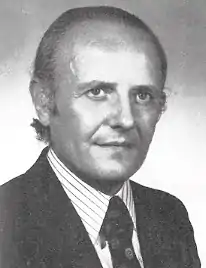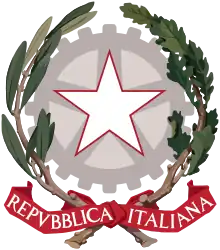Filippo Maria Pandolfi | |
|---|---|
 | |
| Minister of Agriculture | |
| In office 4 August 1983 – 13 April 1988 | |
| Prime Minister | Bettino Craxi Amintore Fanfani Giovanni Goria |
| Preceded by | Calogero Mannino |
| Succeeded by | Calogero Mannino |
| Minister of Industry, Commerce and Crafts | |
| In office 20 December 1980 – 28 June 1981 | |
| Prime Minister | Arnaldo Forlani |
| Preceded by | Antonio Bisaglia |
| Succeeded by | Giovanni Marcora |
| In office 1 December 1982 – 4 August 1983 | |
| Prime Minister | Amintore Fanfani |
| Preceded by | Giovanni Marcora |
| Succeeded by | Renato Altissimo |
| Minister of Treasury | |
| In office 13 March 1978 – 18 October 1980 | |
| Prime Minister | Giulio Andreotti Francesco Cossiga |
| Preceded by | Gaetano Stammati |
| Succeeded by | Beniamino Andreatta |
| Minister of Finance | |
| In office 30 July 1976 – 13 March 1978 | |
| Prime Minister | Giulio Andreotti |
| Preceded by | Gaetano Stammati |
| Succeeded by | Franco Maria Malfatti |
| Member of the Chamber of Deputies | |
| In office 5 June 1968 – 19 December 1988 | |
| Personal details | |
| Born | 1 November 1927 Bergamo, Italy |
| Political party | Christian Democracy |
| Alma mater | Università Cattolica del Sacro Cuore |
| Occupation | Manager |
Filippo Maria Pandolfi (born 1 November 1927) is a former Italian politician, minister, and European commissioner.
Pandolfi graduated in philosophy at the Università Cattolica Milano, taught for some years and then worked for a publisher of scholastic books.
He was a member of the Christian Democracy party. He was elected to the Italian parliament in 1968, heading the list in electoral district of Brescia–Bergamo in 1976, 1979, 1983, and 1987.
Filippo Pandolfi was finance undersecretary in the Aldo Moro government from 1974 to 1976. In 1976 he became Minister of Finance, in 1978 Minister of the Treasury, then from 1980 to 1983 Minister for Industry and Trade, and finally from 1983 to 1988 Minister of Agriculture and Forestry.
From 6 January 1989 to 5 January 1993 he was the European Commissioner in the Delors Commission, having portfolio for Research and Development.[1]
References
- ↑ Deborah, MacKenzie (2 January 1993). "Europe: under new management – This week, two new commissioners take charge of the European Community's research programme. Many scientists want the new bosses to consider radical change". New Scientist. Retrieved 1 December 2010.
External links
- Online biography at Atheneum NAE website (in Italian)
